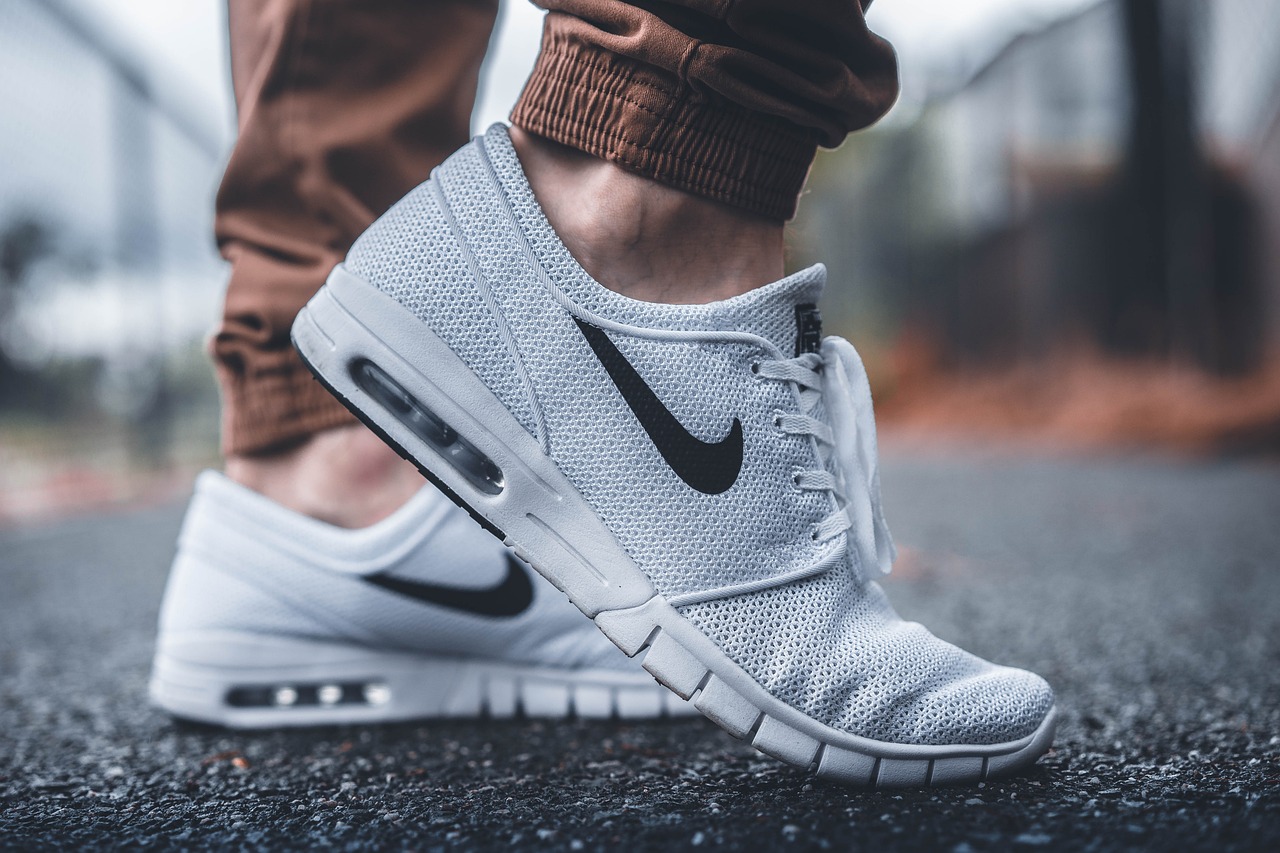Nike made its entry into the Korean market in 1994 under the banner of “Nike Sports Korea”. In 1996, merely two years after its launch, Nike Sports Korea secured sponsorship deals with the KFA (Korean Football Association) and the Korea Republic National Football Team, solidifying its presence in the Korean sports arena. Since then, it has consistently maintained its position as the leading sports and lifestyle brand in Korea.
Download our full Korea Consumer Trends report

To effectively target the influential MZ generation, Nike has employed a diverse range of strategies. These include establishing flagship stores, creating exclusive apps for limited releases, and offering fun, customizable options. These meticulously planned marketing strategies have propelled Nike to the forefront of the Korean sports market, with improving outcomes. In 2022, Nike Korea reported a 15% increase in sales compared to the previous year, according to Financial Supervisory Service in Korea. Moving into 2023, the company’s sales reached approximately KRW 2.1 trillion for the first time in Korea, marking over 20% growth compared to the previous year.
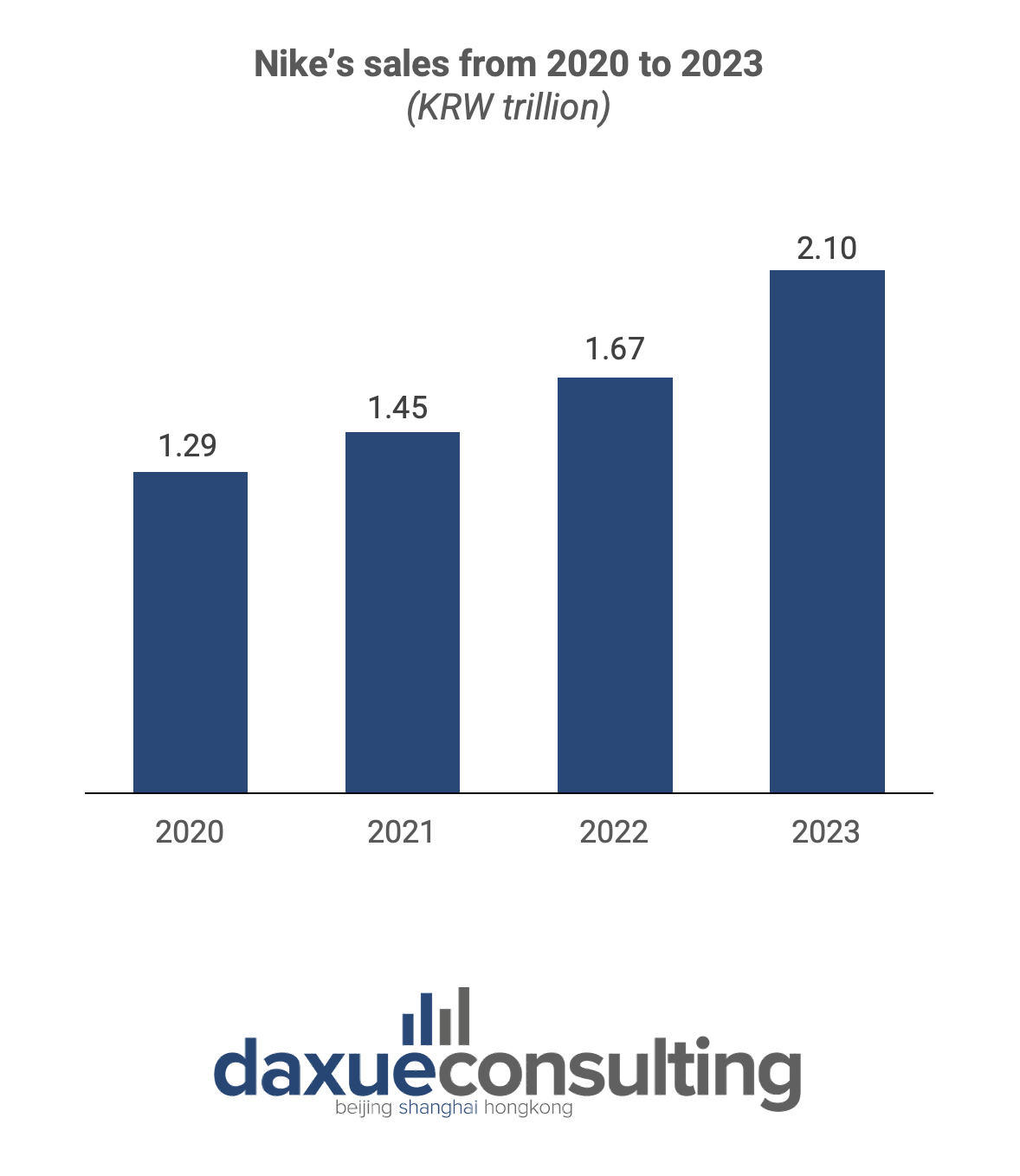
Nike’s evolution in the Korean market: From partnership to ownership
Nike jumped into the Korean market in 1981 through a partnership agreement, initially sharing 50% of the shares with several local sports goods companies. However, in 1994, Nike decided to reclaim full ownership and introduced “Nike Sport Korea” to the public. Since the publication of the first audit report in 2020, Nike Sports Korea has consistently demonstrated annual revenue growth ranging between 15-20%.
Fast forward to 2016, Nike adopted a Direct-to-Consumer (D2C) strategy, which has been a transformative move in the Korean market. This strategy involved introducing different concept stores, enhancing its mobile apps, such as Nike Run Clubs and Training Clubs, and offering more localized marketing campaigns. Altogether, it provided its Korean consumers with a more personalized and engaging experience in the physical and online spaces.
Bridging the digital world to the physical world
Korea holds an important role in Nike’s global strategy. Many young consumers in Korea are comfortable with technology, and they are willing to visit physical stores especially for the experience. As part of its D2C strategy, Nike has established different types of concept stores that offer customers a fun and immersive experience compared to regular stores. These concept stores have become “a place to stop by for fun”. Customers can enjoy a branded experience – a fusion of in-person and digital experiences – even without having to make a purchase.
Nike’s cool concept stores: Where shopping meets adventure
In 2022, for the first time in the world, Nike opened Nike Style in Hongdae. This concept store caters to sport lifestyle enthusiasts with local collections, digital-physical spaces, and community events. The store has a gender-agnostic area catered to the evolving fashion trends. It removes the gender-based product divisions to target the MZ Gen who are open to more gender fluid clothes or even prefer them. Beyond offering lifestyle products, it incorporates retail technologies and activities to create a sense of community. It has activities like “Nike By You” workshops, where consumers can design their own shirt. It also has a content studio with customizable backdrops for local creators and consumers to create content, as well as exclusive services like “SNKRS Lounge” for its members.
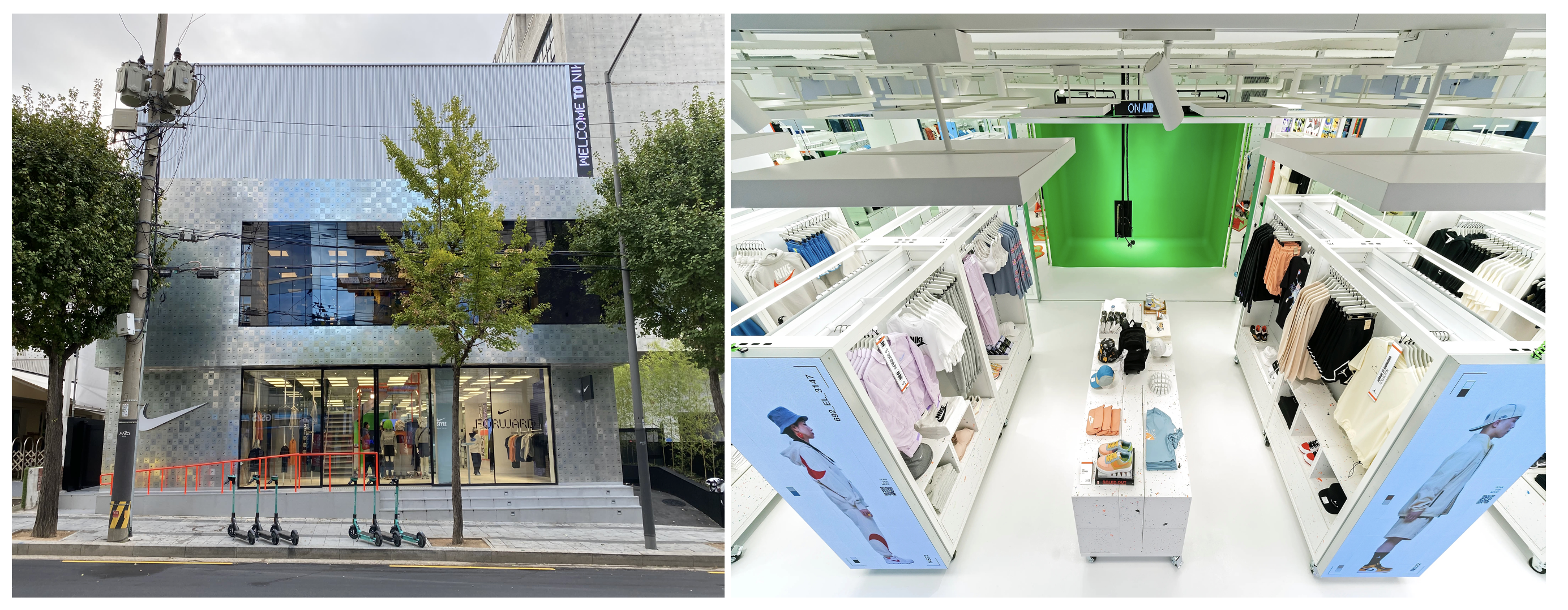
Previously, Nike had introduced “Nike Rise” mega stores, which largely incorporate technologies and data-driven features to ultimately “create immersive store experiences”. Nike Rise in Myeongdong, located in the heart of Seoul, has been widely popular not only among local people but tourists who visit it. People love it mainly for its customization services and fun tech features. While its popularity is mainly due to its customization services, it incorporates technologies that allow consumers to get an immersive experience. The store has a three-story high screen where people can watch short videos and even real-time running statistics from the local community. It also has “Inside Track”, where consumers can place two shoes on it and have the product information displayed.
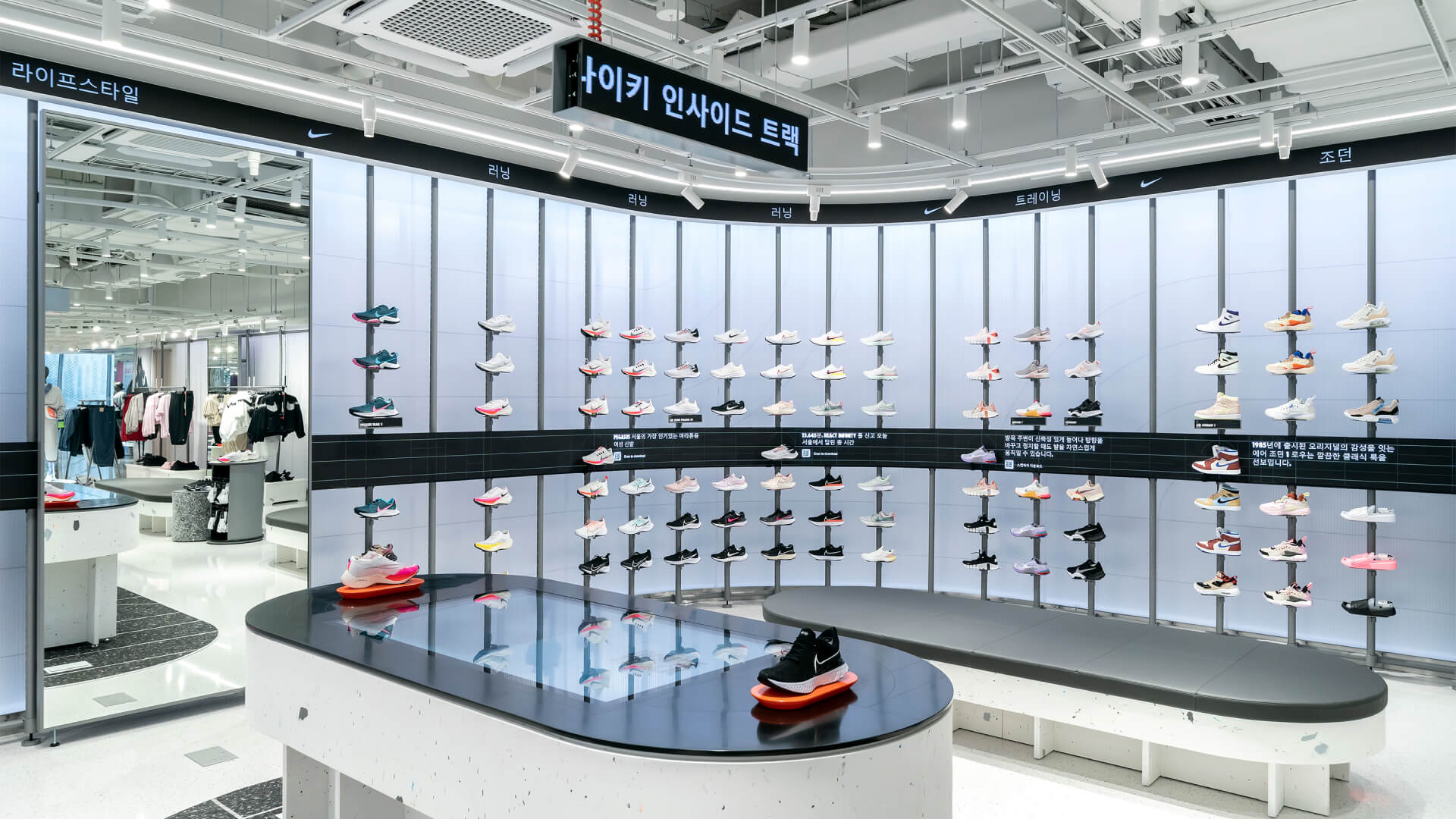
Nike’s digital evolution: Creating a fluid shopping experience
Just like in-store experience matters, Nike has been dedicated to online experiences to its Nike members beyond shopping. In March 2023, Nike launched a new official app mirroring the website’s purchasing experience for a better connection between online and in-person experience. This app offers convenient features such as in-store pick-up, access to limited-edition products, and early access to sales. Additionally, Nike holds “Member Days” throughout the year, allowing its members to enjoy special offers like limited-edition products, exclusive product discounts, and vouchers or discount coupons for completing running challenges. As of September 2023, the Nike app ranked second among shopping apps, and fourth in free apps on the iOS app store.
Joining the Nike community: how Nike connects with fans
Nike launched apps like “Nike Run Club” and “Nike Training Club” to inspire customer loyalty and create an ecosystem that extends beyond footwear and sportswear. Its apps allow young consumers to engage in lifestyle activities together. The “Nike Run Club”, for example, is where participants come together for organized running events hosted by Nike. These events are held at specified locations and times, allowing participants to run together. Through the app, participants can track their running time, distance, and routes and share their achievements on social media. More than 80% of its users are between 20 and 39 years old, and it ranks as the number three most popular health app as of October 2023.
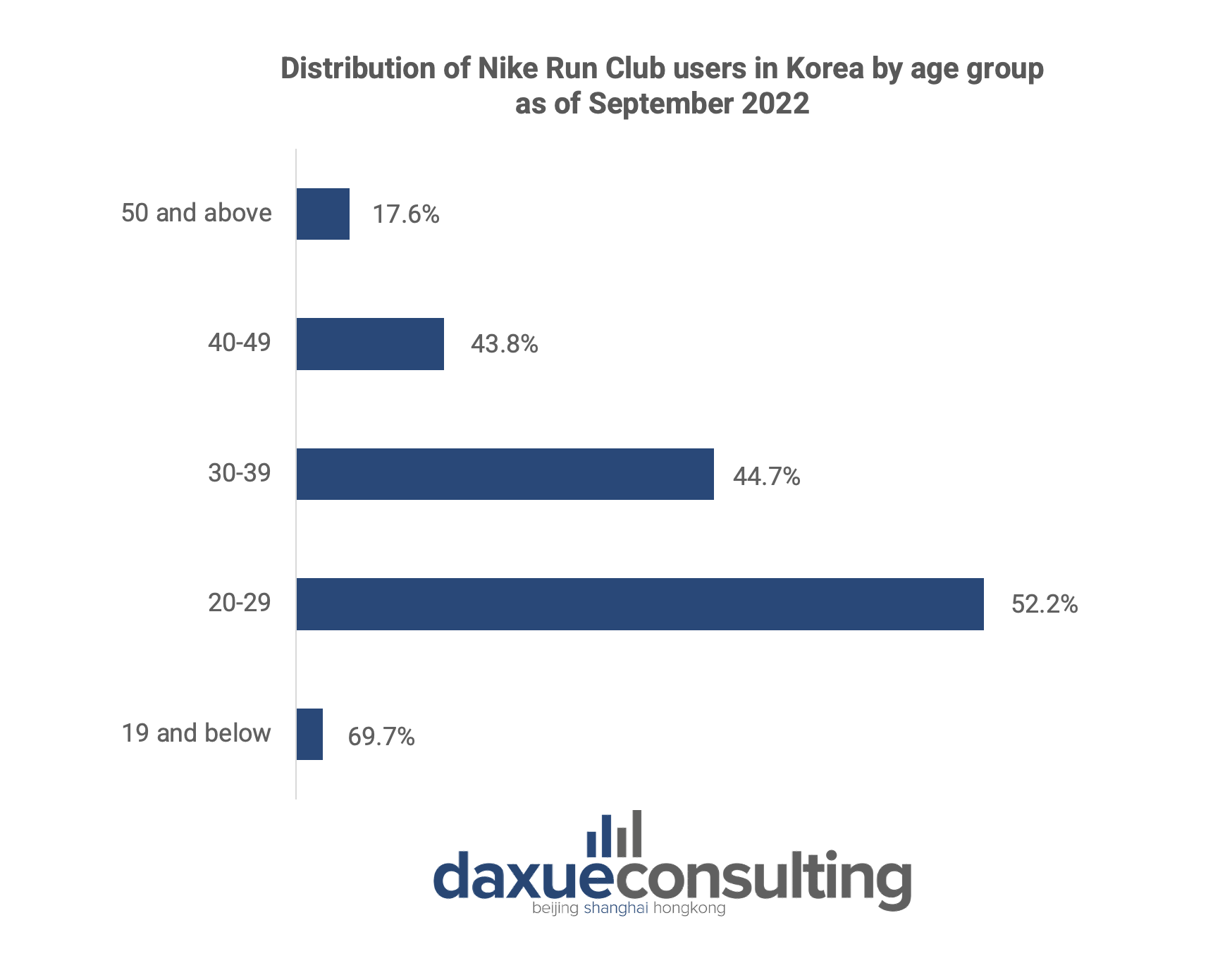
Nike and NewJeans: A K-pop collab that rocked Korea
Nike has been involved in co-branding in South Korea. They have collaborated with trendy celebrities who hold significant influence among the young generation, who are highly attuned to trends and closely follow their favorite stars. One such example is NewJeans, a K-pop idol who has served as a top advertising model for Coca Cola, Dior, and McDonald’s. Nike collaborated with them to appeal not only as a sports brand but also as a trendy lifestyle brand.
In January 2023, Nike released a video as a collaborative effort with NewJeans. The 30-second video, part of its #AFeelForEveryYou Campaign, garnered over 5 million views on YouTube within eight months. The majority of the comments centered around how great all the members look in Nike clothes and how Nike and NewJeans work together.
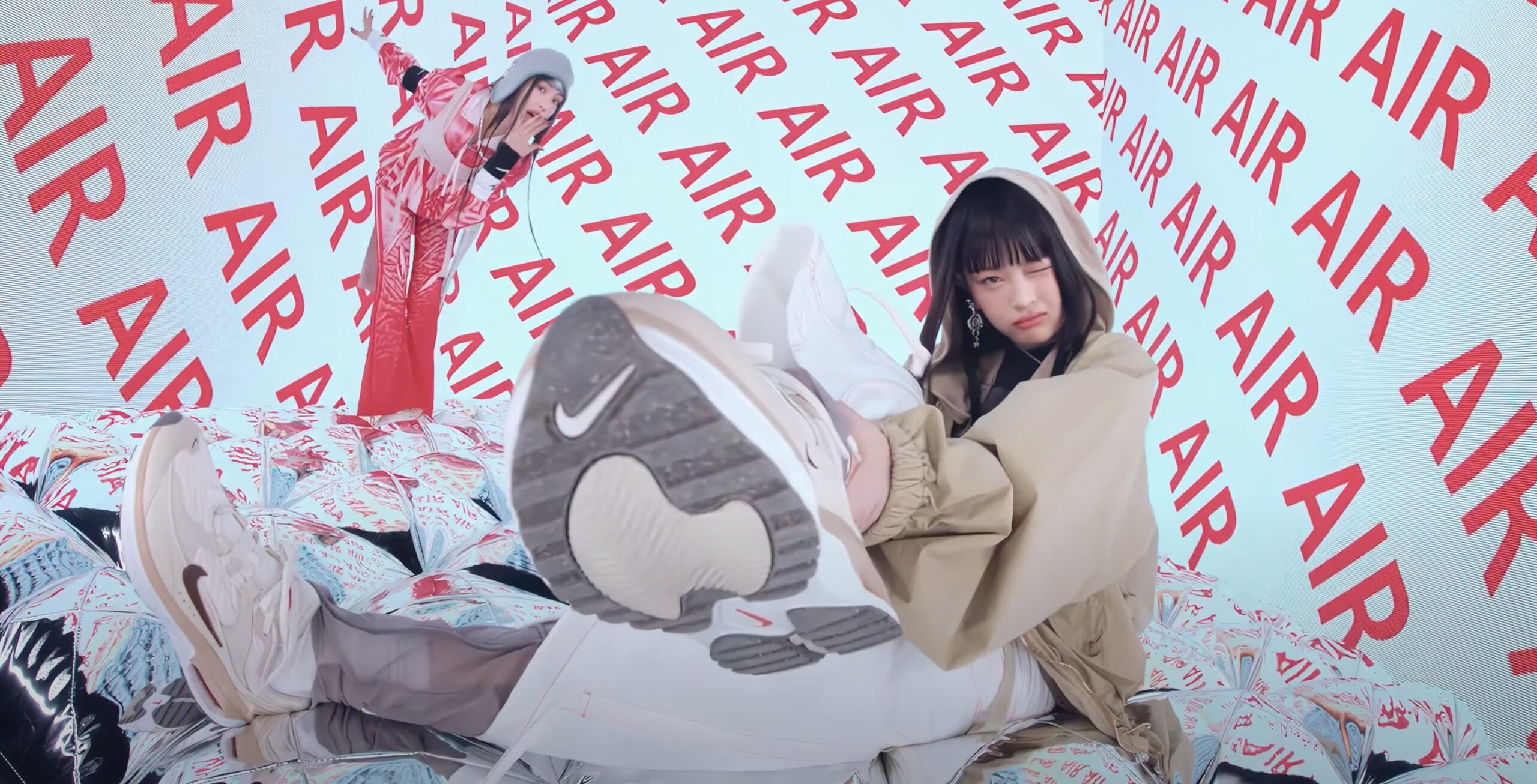
Nike has also partnered with Peaceminusone, co-founded by G-Dragon, former member of Big Bang, to release a limited-edition pair of sneakers. This collaboration gained significant, with the sneakers, sold at KRW 219,000, reaching a resell price of up to KRW 10 million. Collaborations with celebrities like this serve as a testament to Nike’s ability to engage with influential figures in the entertainment industry, creating buzz and driving demand among a diverse and dedicated consumer base.
Decoding success: Key insights from Nike in Korea
- In 2016, Nike adopted a Direct-to-Consumer (D2C) strategy, focusing on bridging the gap between online and in-person experiences. In pursuit of this goal, Nike has rolled out cutting-edge technologies and personalized experiences for its consumers, all at improving the overall experience.
- Moreover, to foster customer loyalty and create a broader brand ecosystem, Nike has launched several dedicated apps like “Nike Run Clubs” and “Nike Training Club”.
- Nike’s collaborations with influential figures like G-Dragon and NewJeans have driven demand and buzz among a diverse consumer base. These collaborations resonate not just with sports enthusiasts but also with people from diverse backgrounds who wear Nike for lifestyle.


